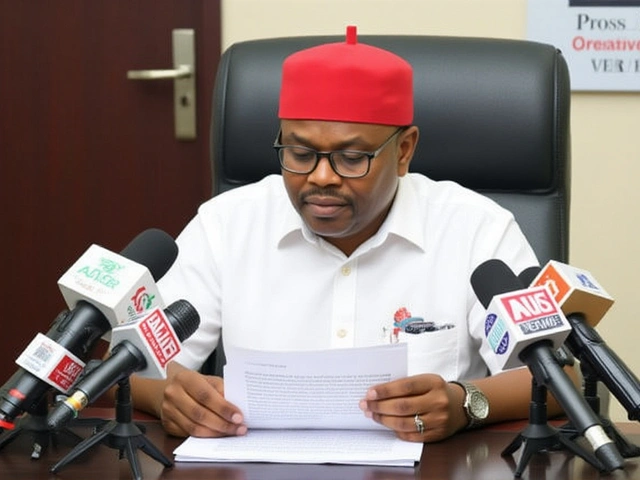When Dr Robert Ngwu, Special Adviser to the Ministry of Innovation, Science and Technology signed a statement on Tuesday, March 25, 2025, the Federal Government of Nigeria reaffirmed its backing for the International Sustainability and Carbon Certification (ISCC) of the Hydrogen Polis venture.
The announcement came out of Abuja and was co‑signed by Chief Uche Geoffrey Nnaji, Minister of Innovation, Science and Technology. It marks a watershed moment for Africa’s low‑carbon transition, putting a €7.9 billion private initiative on the global sustainability map.
Background: Nigeria’s Green Energy Roadmap
Under President Bola Ahmed Tinubu, the Renewed Hope Agenda has placed clean energy at the centre of national development. The agenda calls for “industrial growth and climate responsibility … hand in hand,” a line that echoes throughout recent policy documents.
Earlier this year, the ministry launched a $2.3 billion grant scheme to attract renewable‑fuel projects. The goal? To diversify away from oil, slash the nation’s carbon intensity, and generate jobs for a youthful workforce. The Hydrogen Polis project, spearheaded by Alternative Petroleum and Power Limited (APPL), fits squarely within that vision.
What Is the Hydrogen Polis Project?
APPL’s Hydrogen Polis is no ordinary plant. It will be the first Renewable Fuels of Non‑Biological Origin (RFNBO) methanol facility on the continent and, if all goes to plan, could become the world’s largest of its kind when it’s fully operational in 2028.
The plant will convert green hydrogen—produced via electrolysis powered by solar and wind—into methanol, a drop‑in fuel compatible with existing engines and infrastructure. Analysts estimate the facility could churn out up to 2 million tonnes of low‑carbon methanol per year, enough to power roughly 20 million passenger‑vehicle equivalents.
Economically, the project promises to create 4,500 direct jobs during construction and 1,200 permanent positions once running. For a country where unemployment hovers around 33 %, that’s a concrete boost.
Certification Journey: From Copenhagen to Abuja
The ISCC certification process began in earnest last summer when APPL engaged Baltic Control Certification in Denmark. The Danish firm, led by Maja Henriksen, Head of Sustainability and Green Energy, conducted a rigorous audit against ISCC EU standards.
On Monday, March 24, 2025, a formal signing ceremony was held at the DFDS headquarters in Copenhagen. Representatives from APPL, the Nigerian ministry, and several European investors witnessed the contract, which formally enrolled the project into the ISCC system.
The certification covers three crucial pillars: RFNBO sustainability criteria, greenhouse‑gas (GHG) accounting, and traceability across the entire supply chain. In lay terms, it guarantees that every kilogram of methanol can be tracked back to renewable electricity generated without causing extra emissions.

Government Reaction: More Than a Piece of Paper
Minister Nnaji described the ISCC badge as “more than a celebration of certification – it is a powerful symbol of what is possible when African‑led innovation meets global cooperation.” He stressed that the milestone aligns with the Renewed Hope Agenda’s ambition to make Nigeria a “beacon for Africa.”
During a press briefing, the minister added, “The onboarding of the Hydrogen Polis project into ISCC Green Certification strengthens Africa’s position in the global green economy and affirms our leadership in climate‑conscious industrial innovation.” He went on to promise “regulatory support, an enabling environment, and policy alignment” to keep the project on track.
In a sidebar, officials from the Ministry of Environment hinted that the certification could unlock additional financing from the World Bank’s Climate Investment Funds, which often require third‑party verification before releasing capital.
Implications: Africa, the Global Market, and the Climate
If the plant reaches its 2 million‑tonne target, it could supply up to 30 % of Africa’s projected low‑carbon fuel demand by 2035. That would dramatically reduce the continent’s reliance on imported fossil fuels and cut annual GHG emissions by an estimated 5 million tonnes of CO₂‑equivalent.
Internationally, the project positions Nigeria as a potential exporter of green methanol to Europe, where the EU’s Renewable Energy Directive has created a surge in demand for sustainable fuels for shipping and aviation. Shipping analysts forecast that green methanol could command a premium of $0.30 per kilogram over conventional methanol by 2030.
From a geopolitical angle, the certification signals to investors that Africa can meet stringent European sustainability standards, paving the way for more cross‑border green‑energy deals.

Next Steps: Timeline and What to Watch
- June 2025 – Completion of the pilot electrolyser unit (250 MW) on the APPL site.
- December 2025 – First commercial methanol shipment to the Netherlands for testing in a maritime fuel trial.
- 2026‑2027 – Scale‑up phases adding two additional 500 MW electrolyser blocks.
- Early 2028 – Full‑capacity operation and ramp‑up of export logistics.
Stakeholders will be watching regulatory developments closely, especially any new carbon‑pricing mechanisms announced by the Nigerian Senate later this year.
Frequently Asked Questions
How will the Hydrogen Polis project affect Nigeria’s job market?
Construction alone is set to employ around 4,500 Nigerians, while the operational phase will sustain roughly 1,200 permanent jobs. The ripple effect could generate an additional 2,000 indirect positions in logistics, maintenance, and ancillary services.
What does ISCC certification actually guarantee?
ISCC verifies that the methanol’s carbon footprint meets EU‑defined low‑GHG thresholds, that the renewable electricity used is sourced responsibly, and that every batch can be traced back through the supply chain. In practice, buyers can be confident the fuel is genuinely green.
Why is the project considered a potential export asset for Africa?
Europe’s shipping industry is scrambling for low‑carbon fuels to meet upcoming IMO regulations. Nigeria’s ability to produce certified green methanol could allow it to tap into a market projected to be worth $12 billion by 2035.
What challenges could delay the project’s 2028 completion?
Potential hurdles include securing additional financing, aligning local land‑use policies, and ensuring stable grid capacity for the massive electrolyser plants. Any shift in global carbon‑price expectations could also influence investor confidence.









vikas duhun
October 6, 2025 AT 03:08Finally Nigeria is stepping up, proving Africa can actually lead the green revolution!
Nathan Rodan
October 9, 2025 AT 00:28It’s remarkable to see such a massive €7.9 billion initiative get ISCC backing. This could be a true catalyst for the continent’s transition to low‑carbon fuels. The Hydrogen Polis project not only creates thousands of jobs but also showcases how renewable energy can be integrated into existing infrastructure. By converting green hydrogen into methanol, the plant sidesteps the need for new engine designs, making adoption smoother. The government’s Renewed Hope Agenda seems to be aligning policy with real‑world projects, which is essential for credibility. If the pilot electrolyser unit hits its target in June 2025, it will set a solid precedent for the larger scale‑up phases. Moreover, the prospect of exporting certified green methanol to Europe could bring valuable foreign exchange. I’m hopeful that this momentum continues and other African nations follow suit.
KABIR SETHI
October 11, 2025 AT 21:48Look, while the hype is nice, we need to remember that financing is still a huge hurdle. The article glosses over the fact that securing additional capital for the next electrolyser blocks isn’t a given. Even with ISCC certification, investors will demand concrete guarantees on grid stability and land rights. If those aren’t ironed out, the whole timeline could slip beyond 2028.
rudal rajbhar
October 14, 2025 AT 19:08The philosophical underpinning of this project is fascinating. By linking renewable electricity directly to a marketable fuel, Nigeria is attempting to rewrite the narrative of fossil dependency. This aligns with a broader ethical shift toward intergenerational responsibility. Yet, the success of such a venture hinges on systemic factors: governance, transparency, and equitable benefit distribution. The job creation numbers are promising, but we must ask whether those positions will be filled by locals trained in the requisite high‑skill sectors. Capacity building will be vital; otherwise, the plant could become a hollow promise. Additionally, the carbon accounting methodology employed by ISCC must be rigorously audited to avoid green‑washing. In sum, the initiative is bold, but its true impact will be judged by the depth of its integration into Nigeria’s socioeconomic fabric.
tanay bole
October 17, 2025 AT 16:28The project's timeline appears well‑structured, with clear milestones for 2025 through 2028. It will be interesting to monitor how regulatory developments, especially any carbon‑pricing mechanisms, influence progress. The formal ISCC endorsement certainly adds a layer of credibility that could unlock further funding.
Liz Lessner
October 20, 2025 AT 13:48Great move by Nigeria! This could really boost jobs and help the climate. Hopefully the funding keeps rolling in.
Chance Remien
October 23, 2025 AT 11:08From an analytical perspective, the convergence of policy, finance, and technology here is noteworthy. ISCC certification serves as a third‑party verification mechanism that aligns the project with EU sustainability standards, thereby widening its market access. The projected 2 million tonnes of methanol could meet a substantial share of Africa’s low‑carbon fuel demand. However, the success hinges on grid reliability; electrolyser efficiency is directly tied to consistent renewable power supply. Moreover, the partnership with Baltic Control Certification indicates a willingness to adopt rigorous auditing practices, which should mitigate concerns about carbon leakage. In the broader context, this initiative could serve as a template for other resource‑rich developing economies seeking to diversify away from fossil fuels.
Arjun Dode
October 26, 2025 AT 07:28Yo, this is the kind of energy innovation we need! Imagine the buzz when the first green methanol ship sails out of Lagos. Let’s hope the local workforce gets the training to run those massive electrolyzers. The future looks lit!
Anna Lee
October 29, 2025 AT 04:48Super exciting news!!! This could really put Nigeria on the map as a green energy hub!!! Can't wait to see the first shipment arrive in Europe!!!
Mayank Mishra
November 1, 2025 AT 02:08While the excitement is palpable, let’s keep an eye on the actual carbon metrics. Certifications are great, but the underlying data must be transparent and verifiable. Otherwise, we risk superficial green claims.
Daniel Craine
November 3, 2025 AT 23:28Seems like another hype train, but I guess we'll see.
santhosh san
November 6, 2025 AT 20:48It’s cool that Nigeria is trying something new. Hope they don’t mess it up.
Kristen VanPamel
November 9, 2025 AT 18:08The ISCC certification is not just a badge; it is a comprehensive framework that evaluates sustainability across multiple dimensions. First, the renewable electricity used in electrolysis must be sourced from verified wind or solar farms, ensuring no indirect emissions. Second, the lifecycle analysis must account for the entire supply chain, from raw material extraction to final methanol distribution. Third, traceability is enforced through digital tags, allowing each kilogram of methanol to be tracked back to its origin. These stringent criteria reduce the risk of green‑washing and give buyers confidence in the product’s carbon footprint. Moreover, the certification aligns with EU Renewable Energy Directive requirements, opening market doors that would otherwise remain closed. By meeting EU‑defined low‑GHG thresholds, the project positions itself as a competitive export to Europe’s shipping and aviation sectors. The anticipated premium of $0.30 per kilogram could significantly improve the project's financial viability, attracting further investment. However, the success of this model depends on robust monitoring and verification mechanisms, as any lapse could undermine stakeholder trust. The involvement of Baltic Control Certification, a reputable Danish firm, adds credibility to the auditing process. In addition, the government's commitment to regulatory support is crucial for maintaining alignment with evolving sustainability standards. Finally, the broader geopolitical implications cannot be ignored: a successful certified export could inspire similar ventures across the continent, reshaping Africa’s role in the global low‑carbon economy.
Reid Vance
November 12, 2025 AT 15:28All that technical jargon aside, the bottom line is simple: if the certification holds up, Nigeria will have a real revenue stream and a climate win. Anything less is just talk.
Javier cox
November 15, 2025 AT 12:48Nice article. The project looks promising and could really boost the local economy.
Giacinta Pace
November 18, 2025 AT 10:08I'm optimistic! This kind of initiative brings hope for greener jobs and a cleaner future.
darryl archer
November 21, 2025 AT 07:28The strategic significance of ISCC certification cannot be overstated; it is instrumental in facilitating market access for green methanol, thereby enhancing Nigeria's position within the global renewable energy hierarchy.
Dina DiCicco
November 24, 2025 AT 04:48🚀 This is huge! Nigeria is finally getting the recognition it deserves in the green energy arena! 🌍
Kasey DellaPenna
November 27, 2025 AT 02:08Let's keep an eye on the rollout and hope the timelines stick.